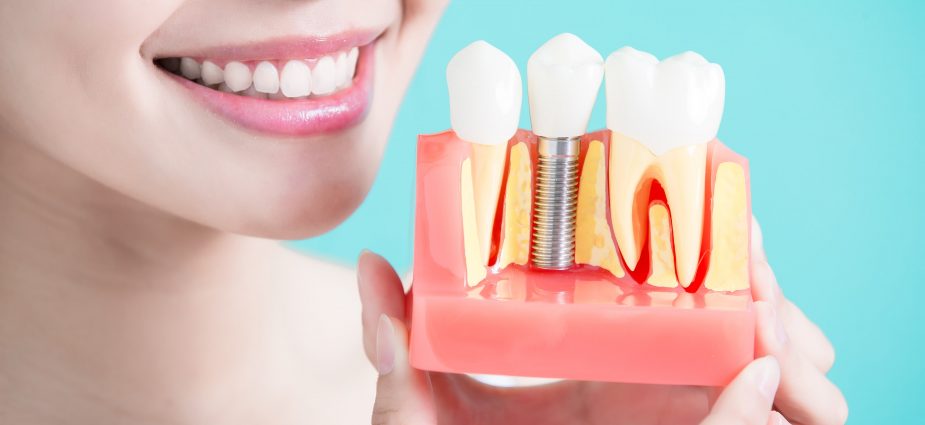Dental Implants
A dental implant is an artificial tooth root that is placed into your jaw to hold a replacement tooth or bridge. Dental implants may is the best option for people who have lost a tooth or teeth due to periodontal disease, an injury, or some other reason.
Types of DENTAL Implants
Endosteal (in the bone): This is the most commonly used type of implant. The various types include screws, cylinders or blades surgically placed into the jawbone. Each implant holds one or more prosthetic teeth. This type of implant is generally used as an alternative for patients with bridges or removable dentures.
Subperiosteal (on the bone): These are placed on top of the jaw with the metal framework's posts protruding through the gum to hold the prosthesis. These types of implants are used for patients who are unable to wear conventional dentures and who have minimal bone height.
Are You a Candidate for Dental Implants?
The ideal candidate for a dental implant is in good general and oral health.
Dental implants are intimately connected with the gum tissues and underlying bone in the mouth. Since periodontists are the dental experts who specialize in precisely these areas, they are ideal members of your dental implant team. Not only do periodontists have experience working with other dental professionals, they also have the special knowledge, training and facilities that you need to have teeth that look and feel just like your own. Your dentist and periodontist will work together to make your dreams come true.
What Is A DENTAL IMPLANT PROCEDURE Like?
This procedure is a team effort between you, your dentist and your periodontist. Your periodontist and dentist will consult with you to determine where and how your implant should be placed. Depending on your specific condition and the type of implant chosen, your periodontist will create a treatment plan tailored to meet your needs.
Replacing a Single Tooth If you are missing a single tooth, one implant and a crown can replace it.
Replacing Several Teeth If you are missing several teeth, implant-supported bridges can replace them.
Denture ImplantsFour On Four Implants
implant supported full denture
Replacing All of Your Teeth If you are missing all of your teeth, an implant-supported full bridge or full denture can replace them.
What Can I Expect After RECEIVING A DENTAL IMPLANT?
As you know, your own teeth require conscientious at-home oral care and regular dental visits. Dental implants are like your own teeth and will require the same care. In order to keep your implant clean and plaque-free, brushing and flossing still apply!
After treatment, your periodontist will work closely with you and your dentist to develop the best care plan for you. Periodic follow-up visits will be scheduled to monitor your implant, teeth and gums to make sure they are healthy.
For centuries, the best option for those who had lost teeth was to have dentures fitted. However, thanks to advances in dentistry, more and more people are now choosing to have dental implants fitted instead. Fixed implants sit in position in your jaw and cannot normally be removed and reinserted in the same way dentures can. There are a number of reasons why implants beat dentures for those who need help with tooth loss.
Long lasting
Implants can last up to 20 years if high quality solutions are purchased. This is much longer than standard dentures are able to last for. If you choose dentures, you may be forced to visit the dentist again and again to have your dentures renewed. If you do not look after your dentures properly, they can degrade quickly and become unusable.
Stability
Unlike dentures, dental implants sit in a fixed position in your mouth. Because they are often not permanent, dentures can rock or shift in position. This can make eating less comfortable, especially if you want to eat something which is crunchy or harder. Because they may be unstable, it can put unnatural and uneven pressures on some areas of your mouth. However, this is much less of a problem with dental implants, as they are fixed in position. Because they are fixed, you also don't have to worry about them falling out when talking or eating, which means that you can avoid some embarrassing situations.
Comfort
Dental implants are often fitted with comfort in mind. Rather than transferring the force of chewing to your gums, as some dentures can do, implants transfer the force of chewing to your jaw bone. Natural teeth transfer the force to your jaw as well, so this is the most comfortable solution. Food is also much less likely to get trapped under these implants, due to the way that they are fitted into your jaw. This contrasts with removable dentures, which food often gets stuck underneath.
Oral health
Wearing dentures can worsen receding gums and speed up the degradation of your jaw bone. Both of these things can lead to more serious health issues. On the other hand, dental implants reduce stress on your gums, so long as you maintain an appropriate oral healthcare routine. Scientists all believe that implants encourage bone stimulation and reduce bone decay in your jaw.
Increased confidence
Many people who wear cheap dentures feel unconfident, especially talking or eating. This means that they often have a reduced quality of life, because they do not socialise as much as they would like to, or they do not visit the restaurants that they would like to visit. Good quality implants can give people the confidence to continue to live in the way that they want to live. By choosing implants rather than dentures, you are opening yourself up to a range of different possibilities.










